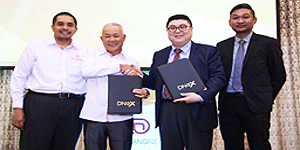
DagangNetPOST recently spoke to Ms Chong Yoke Ching, Chief Executive Officer of SealNet Sdn Bhd virtually as she explained how adapting digitalisation can ease challenges in cross border trade.
What does it mean to digitalise cross border trade?
To put it simply, it means digitalising and sharing information across all parties involved in the trade facilitation value chain. Currently, digitalisation is mostly at parties’ end, for example the importers, exporters, forwarders, shipping lines, hauliers, warehouses and ports have their own systems that are used internally by their own businesses. The information is similar but with very minimal sharing initiative.
Information contained in Invoice, for example is re-used in Flight/Ship Manifest, Customs Declaration, Import/Export Permit, and other trade processes. The same information is then keyed in manually again and again by different parties at different locations, in different systems until the shipment reaches the recipient overseas/ arrives in Malaysia. This is very time consuming, inefficient and prone to human error.
What role does SealNet play when it comes to digitalising cross border trade?
SealNet comes in as a cloud based online platform to allow all parties to digitalise and share data from the source.
From this sharing of data, we are able to automate some of the processes which in turn revolutionises legacy-based system that typically causes redundancy. By ensuring re-usability of data and avoiding re-keying in of the same data more than once, it would lead to quicker decision-making, faster shipment clearance and turnaround time at each key process especially for exporters and importers.
SealNet enables all entities in the supply chain network, within and across countries, to monitor and have real time visibility of events in the supply chain respecting the data sovereignty and security. Such ability is increasingly important for planning for actions to insulate the business from consequences of potential disruption in supply chain networks due to disasters and episodes like the Covid-19 pandemic. SealNet equips organisations with the ability to rapidly assess, recover and respond to their supply chain disruptions.
What is SealNet?
SealNet is a web-based one-stop system that is designed to ease total cargo and trade management processes, connecting exporters and importers with all relevant parties, such as freight forwarders and customs, and enabling the exchange of trade data digitally.
SealNet also complements DNeX's existing eServices for the National Single Window for Trade Facilitation – an electronic system that is used for customs declaration and permit processing Other than that, SealNet also gives value added services such as insurance, trade financing and currency exchange, which are crucial in facilitating trade management processes.
SealNet has partnered and worked with SEEBURGER to employ SEEBURGER Business Integration Suite ("BIS") as the core integration foundation for SealNet services, SEEBURGER BIS is a single integration platform for digital transformation. SEEBURGER BIS, engineered in Germany, is employed by 12,000 organisations across 80 countries including in ASEAN and other countries in Asia Pacific for business and competitive advantage. SealNet is working closely with SEEBURGER to leverage its extensive experience and field proven industrial strength technology in developing solutions including those related to digitalising cross border trade.
SealNet , as an authorised SEEBURGER channel partner, resells, supports and performs professional services related to SEEBURGER BIS.
You mentioned that SEALNET's other services also include insurance, trade financing and currency exchange. Can you elaborate on that?
SealNet can offer a range of services, and one of them is EMI which is an electronic marine cargo insurance quotation system, quotations of which are from several participating insurers. Designed for a seamless purchase of marine cargo insurance, the system offers competitive pricing, convenience, speed, efficiency and accuracy in arranging marine cargo insurance. For trade financing and currency exchange, we are currently in the midst of developing them.
With the current situation in the world combatting the Covid-19 pandemic, how can businesses in trade minimise disruption through digitalising their cross border trade processes?
It is undeniable that the Covid-19 pandemic can adversely affect global trade. As SealNet is a web-based platform, at our end, we introduced the Work From Home service
To minimise disruptions, businesses must need to build resilience. The use of technology to streamline and consolidate operations, and to improve data communication internally and externally, is one of the pillars to build resiliency. Businesses need to consider things like digitalisation, automation, e-commerce and upgrading of skills.
At our end, we are introducing more services, focusing on bridging the upstream and downstream processes with data reusability to reduce duplication in processes. We are working with industry players to make SealNet a digital platform into a shared-environment to improve internal and external connectivity to digitize processes and to reduce reliance on physical contacts.
We are looking beyond cooperation with industry players to provide end-to-end experience with value-creation.











